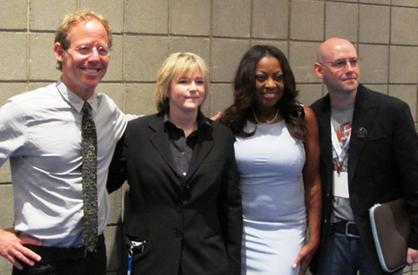I've always loved the sound of books. When people read aloud, I instinctively close my eyes and listen, unless I'm driving my car with an audiobook playing. Close listening is akin to close reading for me. One human being shares a story with another. The allure might have something to do with childhood memories of my mother reading the Oz books to us. Perhaps it is a far more ancient rite, since we were telling each other stories thousands of years before Gutenberg.
On the train home from BookExpo America last week, I was listening, appropriately enough, to the end of Graham Greene's novel Stamboul Train. Amtrak's Empire service from Penn Station to Albany is considerably less intriguing than the Orient Express, but the sound of Michael Maloney's voice effectively transported me away from all that.
Next up in my audiobook queue is Life by Keith Richards, which was named Audiobook of the Year at last week's Audies (check out the other category winners here). It seems like an odd but somehow perfect transition from Graham Greene, and I can't wait to hear the narration by Richards, Johnny Depp and Joe Hurley. If you try sometimes, you get what you need to listen to.
During BEA I attended the Audiobook and Author Tea, sponsored by the Audio Publishers Association. I'm not sure what I expected, but the event--hosted by Star Jones and featuring Tony Horwitz, Karin Slaughter and Brad Meltzer--turned out to be one of the real highlights of the show for me.
In her opening remarks, Jones said that an audiobook was "the reason I wrote my first piece of fiction." On a long flight, she had been listening to The Devil Wears Prada and recalled thinking, "I can't wait till someone actually records my audiobook." As it turned out, however, she eventually narrated Satan's Sisters (Brilliance) herself. "I had a ball reading the sexy parts because I would never use this language myself," she said.
When the conversation turned to working with narrators, Meltzer said, "I have my audiobook narrator with me." He introduced Scott Brick, who stepped up to the podium and delivered the opening lines of The Inner Circle (Hachette Audio), after which Meltzer asked, "Now does that make me sound tough or what?" He also noted that he doesn't interfere with Brick's approach to his novels because audiobook narration "is an art and I don't want to mess with the artist."
Narrating is "a lot harder than it sounds," quipped Horwitz, whose next book is Midnight Rising: John Brown and the Raid that Sparked the Civil War (Macmillan Audio, October). And Slaughter, author most recently of Fallen (AudioGO), confessed that while listening to one of her books being read, she discovered "there were things in the story that I didn’t know were there" and wrote her narrator a fan letter. The person reading a book aloud always matters, especially to the authors who wrote those words.
When I reached the end of Stamboul Train last Friday--somewhere between the Rhinecliff and Hudson stations--I emerged reluctantly from my obsession with foreign intrigue during the 1930s and started thinking about the more mundane and domestic, yet mysterious in its own way, fate of audiobooks in the 21st century.
I worry about them. Maybe I shouldn't, but I do. At the retail level, I've watched as audiobooks followed a curious path, evolving from those bulky boxes of frightfully expensive, unabridged audiobook cassettes in the mid-1990s to the more affordable cassettes--and then CDs--of the past decade. And I have witnessed retail prices plummeting from the $100-plus range to the sub-$40 level over the same time period, though the number of customer complaints about the high cost of audiobooks failed to descend on a comparable curve.
Now digital audiobooks are gaining ground. Although easy to access and reasonably priced for consumers, availability is limited for retailers compared to previous audiobook incarnations. Indie booksellers are currently exploring ways to find their place in the digital audio-realm, which is inhabited by a temptingly upscale demographic.
According to the APA, 21% of audiobook listeners have completed post-graduate work or hold a doctoral degree, twice as many as non-listeners; listeners have a higher estimated median income ($56,000) than non-listeners ($43,000); and audiobook listeners are more voracious readers of print books than non-listeners, with frequent listeners (four or more audiobooks per year) reading a median of 15 books in that period, compared to six books read by people who don’t listen to audiobooks.
June is audiobook month. There's no more appropriate time to explore this corner of the book trade. During the next couple of weeks, we'll talk with some people and listen to what they have to say about audiobooks now. Listening is good.--Robert Gray (column archives available at Fresh Eyes Now)


